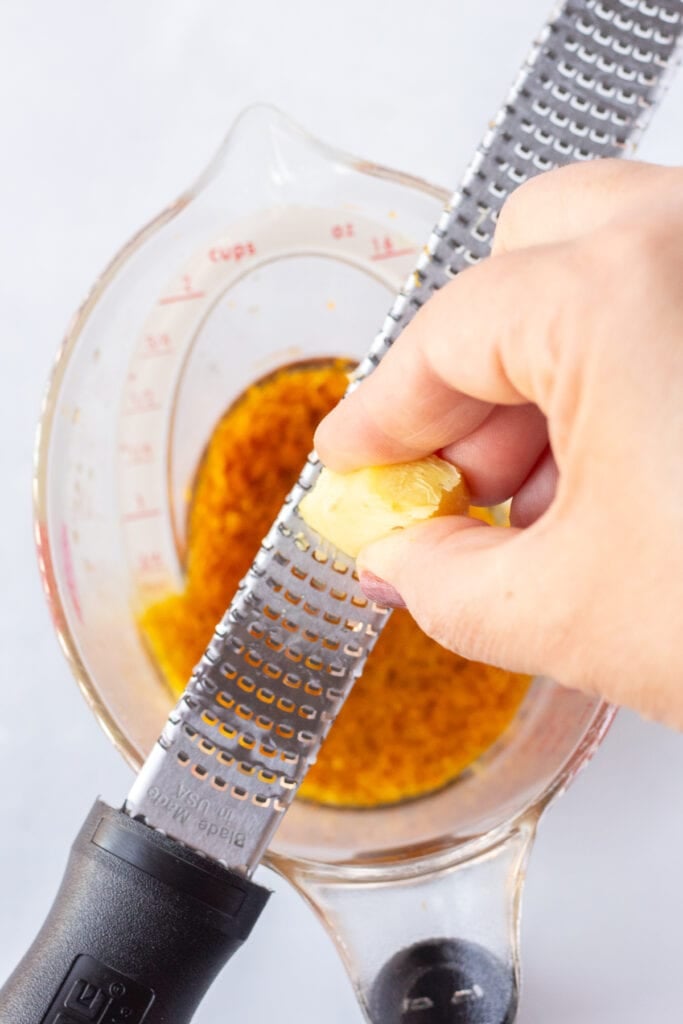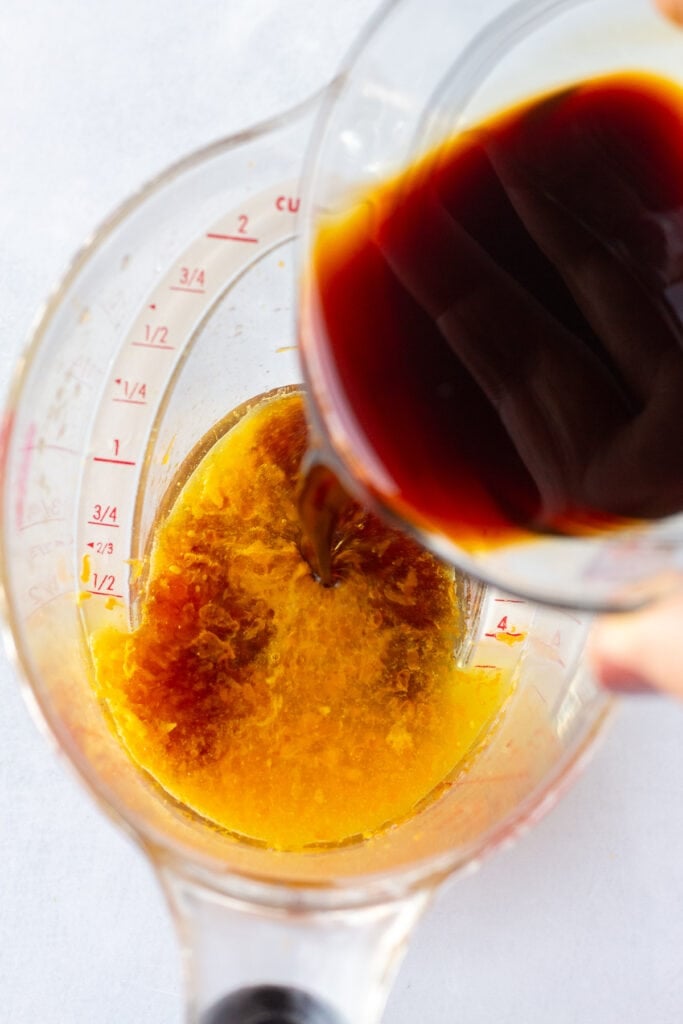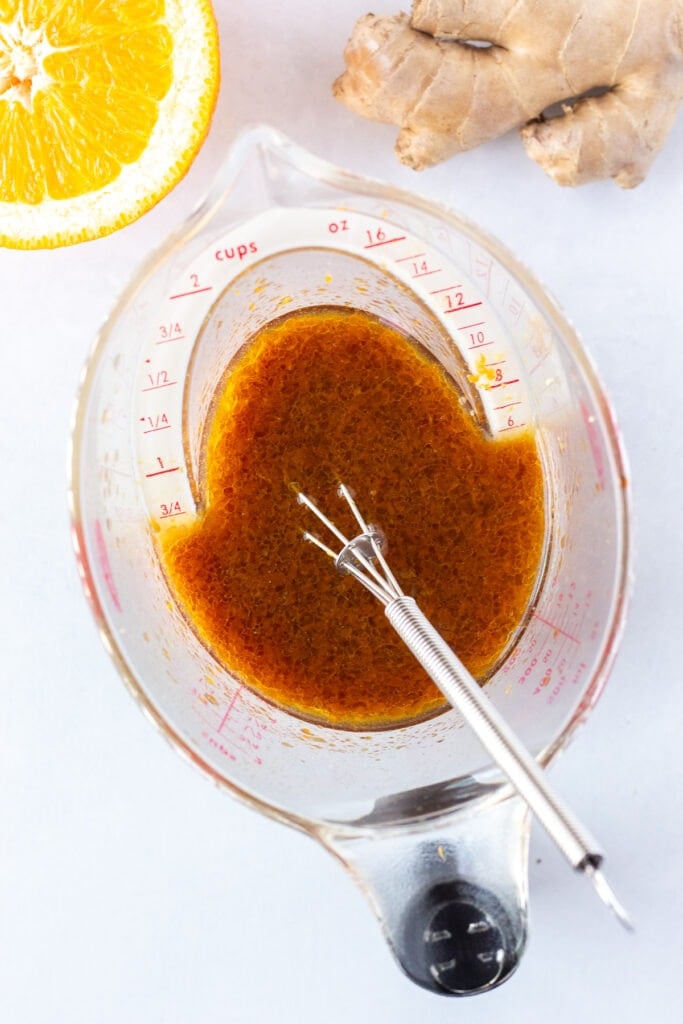Learn how to make a versatile orange juice marinade that works for a variety of proteins. With just a handful of simple ingredients, you can transform chicken, pork, or shrimp into a sweet and tangy dish. Using fresh orange juice, ginger, and a hint of honey, this gluten-free marinade is quick to prepare and adds a citrusy twist to your next meal.
Do you ever try an orange dish and think “this does not have enough orange flavor“?
Not to toot my own horn but I know a thing or two about marinades – I’ve grilled marinated chicken thighs, marinated flank steak, and marinated shrimp, just to name a few.
So when making this orange marinade I leaned on both my experience and knowing I really wanted to orange flavor to come out.
Which is why this marinade uses both the orange juice and orange zest to pack a one-two punch of orange into your protein.
It also has a great sweet and salty vibe to it, from the soy sauce and the honey. Plus a little zing from the fresh ginger.
(Note: the full ingredients list, including measurements, is provided in the recipe card at the bottom of this post.)
Orange juice is sufficiently acidic that overnight would almost certainly be too long. Mixed with some olive oil, lime juice, soy sauce and spices, though, it can make a rather nice marinade for steak, but would likely only need to marinate for 45 minutes.

WHAT MAKES A GOOD MARINADE?
All marinades should have the following 4 elements:
- fat to coat the meat,
- acid to help break down the protein fibers,
- salt to season the meat, and
- spices, herbs, or other flavors.
In this marinade, the oil is the fat, the vinegar and honey act as an acid (and if you use soy sauce it acts as an acid too), the soy or tamari is the salt, and the orange and ginger provide additional flavor.
You’ll want a different marinating time for different types of proteins. Here are my recommendations.
- For shrimp: no longer than 20 minutes. Seriously. Otherwise the acid in the orange juice will start to break down the shrimp and it will turn mushy.
- For chicken: 1 to 2 hours for boneless cuts of chicken, 2 hours for bone-in cuts.
- For pork: 1 hour for thinner or smaller cuts of pork (like thin-cut chops or tenderloin), and 2 hours for thicker cuts (like boneless pork chops).
TIPS FOR ZESTING AN ORANGE
- Don’t cut the orange before you zest it. A full orange is going to be easier to handle than half an orange, and you won’t have to worry about juice squeezing out when you zest it.
- A microplane is going to give you the best results as it’s easiest to handle and has very small holes. If you don’t have a microplane, use the side of a box grater with the smallest holes.
- Rest the microplane on the rim of a medium to large bowl that’s on a flat surface. This will help stabilize microplane and make it easier to apply pressure on the orange.
- Start out pressing the orange very lightly onto the microplane so you only get the zest and not the pith (the whiteish part between the zest and the flesh). If you need to you can always go back over parts of the orange, but you can’t go back and pick pith out of parts you’ve already zested!
- Short movements are best when zesting. Since an orange is round, the longer your zesting movements the more adjustments you’ll have to make. This can lead to over-zesting and getting the pith in the zest. Do short swipes of the orange and rotate the orange slightly after every one or two swipes.



Use the marinade immediately, or store it in an airtight container in the fridge for up to 1 week.
This recipe makes about 7 ounces of marinade, which is enough for between 1.5 and 2 pounds of meat.
Chicken (Orange Marinade)
FAQ
Does orange juice tenderize meat?
What liquid is best for marinade?
What is a good base for a marinade?
